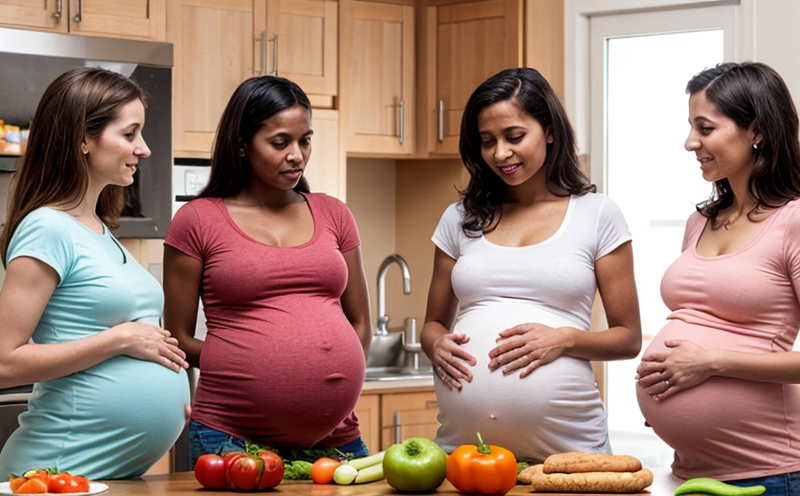
-
Food Safety and Testing-
Food Safety for Special Populations-
Food Safety and Nutritional Needs of Pregnant Women
We provide comprehensive solutions designed to help our clients mitigate risks, enhance performance, and excel in key areas such as quality, health & safety, environmental sustainability, and social responsibility.
Discover
For many years, our organization has been operating successfully, boasting modern laboratories that meet international standards. These laboratories are equipped with the latest technology devices and equipment, and we have built a strong team of experienced and trained personnel to operate them.
DiscoverWelcome to Eurolab, your partner in pioneering solutions that encompass every facet of life. We are committed to delivering comprehensive Assurance, Testing, Inspection, and Certification services, empowering our global clientele with the ultimate confidence in their products and processes.
Discover
-
Food Safety and Testing-
Food Safety for Special Populations-
Food Safety and Nutritional Needs of Pregnant WomenFood Safety and Nutritional Needs of Pregnant Women
Pregnancy is a critical period for both the mother-to-be and her unborn child. During this time, the womans body undergoes various changes to support the growth and development of the fetus. Adequate nutrition plays a vital role in ensuring that the baby receives all the necessary nutrients, vitamins, and minerals required for its growth and development.
However, food safety is also a significant concern during pregnancy, as it can have serious consequences on both the mothers health and the health of the unborn child. In this article, we will discuss the nutritional needs of pregnant women and highlight some key food safety guidelines that expectant mothers should follow.
Nutritional Needs of Pregnant Women
Pregnancy requires a balanced diet to support the growth and development of the fetus. The nutritional requirements for pregnant women are as follows:
Leafy green vegetables (spinach, kale, collard greens)
Legumes (lentils, chickpeas, black beans)
Nuts and seeds (almonds, walnuts, chia seeds)
Fortified cereals
Dairy products (milk, cheese, yogurt)
Leafy green vegetables (kale, broccoli, spinach)
Fortified plant-based milk
Tofu and other soy products
Iron: Importance and Sources
Iron is essential for fetal growth and development during pregnancy. Some key points about iron are:
Red meat (beef, lamb, pork)
Poultry (chicken, turkey)
Fish (salmon, sardines, anchovies)
Legumes (lentils, chickpeas, black beans)
Protein: Importance and Sources
Protein is essential for fetal growth and development during pregnancy. Some key points about protein are:
Lean meats (chicken, turkey, fish)
Legumes (lentils, chickpeas, black beans)
Nuts and seeds (almonds, walnuts, chia seeds)
Whole grains (brown rice, quinoa, whole wheat bread)
Food Safety: Guidelines and Tips
Some key guidelines for pregnant women are:

Pressure Vessels and Installations Testing
Pressure Vessels and Installations Testing Pressure vessels are a critical component of various ind...

MDR Testing and Compliance
MDR Testing and Compliance: A Comprehensive Guide The Medical Device Regulation (MDR) is a comprehe...

Military Equipment Standards
Military Equipment Standards: Ensuring Effectiveness and Safety The use of military equipment is a ...

Electromechanical Safety Certification
Electromechanical Safety Certification: Ensuring Compliance and Protecting Lives In todays intercon...

Energy and Sustainability Standards
In today’s rapidly evolving world, businesses face increasing pressure to meet global energy a...

Railway Industry Compliance
Railway Industry Compliance: Ensuring Safety and Efficiency The railway industry is a critical comp...

Environmental Impact Assessment
Environmental Impact Assessment: A Comprehensive Guide Environmental Impact Assessment (EIA) is a c...

Aviation and Aerospace Testing
Aviation and Aerospace Testing: Ensuring Safety and Efficiency The aviation and aerospace industr...

Industrial Equipment Certification
Industrial equipment certification is a critical process that ensures industrial equipment meets spe...

Chemical Safety and Certification
Chemical safety and certification are critical in ensuring the safe management of products and proce...

Agricultural Equipment Certification
Agricultural equipment certification is a process that ensures agricultural machinery meets specific...

Trade and Government Regulations
Trade and government regulations play a vital role in shaping the global economy. These regulations ...

Pharmaceutical Compliance
Pharmaceutical compliance refers to the adherence of pharmaceutical companies and organizations to l...

Construction and Engineering Compliance
Construction and Engineering Compliance: Ensuring Safety, Quality, and Regulatory Adherence In the ...

Fire Safety and Prevention Standards
Fire Safety and Prevention Standards: Protecting Lives and Property Fire safety and prevention stan...

Product and Retail Standards
Product and Retail Standards: Ensuring Quality and Safety for Consumers In todays competitive marke...

Transportation and Logistics Certification
Transportation and Logistics Certification: A Comprehensive Guide The transportation and logistics ...

Renewable Energy Testing and Standards
Renewable Energy Testing and Standards: Ensuring a Sustainable Future The world is rapidly transiti...

Lighting and Optical Device Testing
Lighting and Optical Device Testing: Ensuring Performance and Safety Lighting and optical devices a...

Consumer Product Safety
Consumer Product Safety: Protecting Consumers from Harmful Products As a consumer, you have the rig...

Battery Testing and Safety
Battery Testing and Safety: A Comprehensive Guide As technology continues to advance, battery-power...

Healthcare and Medical Devices
The Evolution of Healthcare and Medical Devices: Trends, Innovations, and Challenges The healthcare...

Food Safety and Testing
Food Safety and Testing: Ensuring the Quality of Our Food As consumers, we expect our food to be sa...

NEBS and Telecommunication Standards
Network Equipment Building System (NEBS) and Telecommunication Standards The Network Equipment Bu...

Electrical and Electromagnetic Testing
Electrical and Electromagnetic Testing: A Comprehensive Guide Introduction Electrical and electrom...

Automotive Compliance and Certification
Automotive Compliance and Certification: Ensuring Safety and Efficiency The automotive industry is ...

Hospitality and Tourism Certification
Hospitality and Tourism Certification: Unlocking Opportunities in the Industry The hospitality and ...

Cosmetic Product Testing
The Complex World of Cosmetic Product Testing The cosmetics industry is a multi-billion-dollar ma...

IT and Data Center Certification
IT and Data Center Certification: Understanding the Importance and Benefits The field of Informatio...

Environmental Simulation Testing
Environmental Simulation Testing: A Comprehensive Guide In todays world, where technology is rapidl...